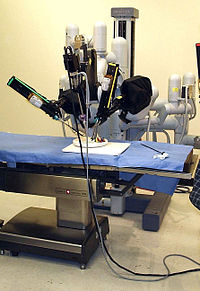 Louisiana plaintiff Wanda B. Tiblier has filed a da Vinci robot surgery lawsuit against Intuitive Surgical Inc. for electrical burns she allegedly sustained from its Monopolar Curved Scissors (MCS), also known as hot shears.
Louisiana plaintiff Wanda B. Tiblier has filed a da Vinci robot surgery lawsuit against Intuitive Surgical Inc. for electrical burns she allegedly sustained from its Monopolar Curved Scissors (MCS), also known as hot shears.
Tiblier chose the da Vinci Surgical System for a hysterectomy she underwent on May 28, 2013. The components of this device included the monopolar current and monopolar scissors, and were used to correct the plaintiff’s irregular premenopausal bleeding. In the same month, Intuitive Surgical issued an Urgent Medical Device Recall letter regarding the monopolar scissors.
The notice stated that the scissors could develop micro-cracks at the end of the device’s shaft, which could create a pathway for energy to leak to tissue. This recall confirmed the suspicions many medical experts had about the potential dangers of the da Vinci Surgical System, based on the injury reports submitted to the U.S. Food and Drug Administration.
According to the da Vinci robot surgery lawsuit, electrical currents caused a tear in the plaintiff’s bladder, which required immediate repair and an additional surgery. Tiblier required a catheter to drain the urine in her bladder, until she was able to have additional surgery to repair her bladder.
The da Vinci robot lawsuit alleges Intuitive most likely knew of the dangers of its da Vinci Surgical System, but chose to not disclose that information until the recall. Tiblier said she never would have used the device if she had known about its design defect, according to her da Vinci lawsuit.
The robotic surgery lawsuit accuses Intuitive Surgical of negligence, false advertising, concealing information, and misrepresenting a product.
Overview of da Vinci Surgical System Complications
The da Vinci Surgical System was released in 2000, and has since been used on a variety of delicate surgeries, which require small, but precise incisions. While expensive, patients favored this device because it was advertised to be more efficient than a typical surgeon. The components of the device were specifically designed to create and seal small incisions for specific surgeries, that ideally make procedures safer, less invasive, and require a shorter hospital stay.
However, most injuries reported in da Vinci robot surgery lawsuits require the patients to stay longer at the hospital, and often require additional corrective surgeries. The complications reported from the da Vinci Surgical System include, but are not limited to:
- Injury to tissues or organs
- Bleeding
- Infection
- Internal scarring which can cause long-lasting dysfunction or pain
- Temporary pain or nerve injury (most commonly occurs during abdominal and pelvic surgery)
This da Vinci robot surgery lawsuit is Wanda B. Tiblier v. Intuitive Surgical Inc., Case No. 2:14-cv-01168-SRD-KWR, in the U.S. District Court for the Eastern District of Louisiana.
Join a Free Da Vinci Robot Class Action Lawsuit Investigation
If you or a loved one were injured by da Vinci robotic surgery complications, you may have a legal claim. See if you qualify to pursue compensation and join a free da Vinci robot class action lawsuit investigation by submitting your information for a free case evaluation:
Oops! We could not locate your form.
ATTORNEY ADVERTISING
Top Class Actions is a Proud Member of the American Bar Association
LEGAL INFORMATION IS NOT LEGAL ADVICE
Top Class Actions Legal Statement
©2008 – 2025 Top Class Actions® LLC
Various Trademarks held by their respective owners
This website is not intended for viewing or usage by European Union citizens.














